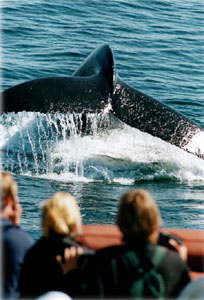A chance encounter between researchers and a group of bowhead whales revealed that whales can sleep completely, without coming to the surface to breathe
Noam Levitan and Dina Volodarsky "Galileo" magazine

As part of a study on the behavior and calls of minke whales, Patrick Miller (Miller), from the University of St. Andrew in Scotland, and his colleagues attached data-loggers to 59 minke whales in the open sea, in order to track their activities around the world. They found that about 7% of the time, especially between the hours of 18:00 and 24:00, the molluscs swam in shallow water for several minutes without showing signs of activity. These periods of inactivity remained unexplained until a group of researchers encountered a group of whales swimming in the water strangely.
The first ones swam vertically, with their noses above or near the surface of the sea. They did not react at all to the boat drifting between them - until it slightly collided with one of them. The scientists were very worried about the reaction of the whales, since whales may react violently when they feel in danger. They know how to defend themselves against killer whales, and are also known to be able to sink ships. The most famous ship-sinking chieftain is the hero of Herman Melville's book - Moby Dick, whose character is based on a real chieftain called "Mokka Dick". To the scientists' delight, the collision only caused the whales - each of which was lighter than the research boat - to move away from the boat and return to floating vertically, i.e. to go back to sleep.
During the follow-up of the porpoises, conducted following the chance meeting, it became clear that unlike the whale and dolphin species studied in captivity, porpoises sleep fully with both eyes closed. Although in the study, published in the journal Current Biology, Miller and his colleagues were unable to see the whales' eyes. But the fact that they didn't react to the boats that passed in their field of vision suggests that they were huge. During the short sleep - which lasts about 10 minutes - the whales are motionless and do not breathe, even when their noses are above sea level.
If indeed the primates sleep only 7% of the time, they will be crowned as mammals with the shortest sleep time. But it is possible that, similar to certain birds, the primroses sleep a deep and refreshing sleep some of the time and sleep only half of their brains at other times. To find out if this is indeed the case, it will be necessary to monitor the brain waves of primates, an operation that is not yet possible in free animals.
Researchers are frightened and Rashtanis are dozing. The video clip commemorates the meeting described above between the whale researchers and the group of first-timers. Photographed by Luke Rendell, one of the authors of the article.

6 תגובות
Abraham:
I haven't dissected a fish myself, but everywhere I've looked it says roughly the same thing, and that's that most fish don't have eyelids.
Read for example here:
http://www.factmonster.com/ipka/A0854907.html
Michael
Fish have transparent eyelids that cannot be moved
The reasons you presented sound very convincing. In my opinion, research should be done on the subject in humans who are during a dive. This could perhaps develop something in the field of developing alertness and physical energy...
A. Ben Ner:
The explanations you gave yourself regarding the reasons for the disappearance of sleepiness while diving seem correct to me.
I think another factor is physical activity itself. I know from my personal experience that there are times when if I sit down to rest on the armchair I will want to go to sleep and if I go for a walk outside or pick fruit from the trees in the yard or whatever - I will not feel any fatigue.
In relation to fish - yes - they sleep - even though they cannot close their eyes because they have no eyelids. Apparently even sharks sleep even though they must stay in motion all the time (including sleeping time) because otherwise no oxygen would reach their bodies.
In general, when there is a question of this type it is recommended to use the website http://www.ask.com which answers questions formulated in human language.
For example - if you ask the question Do fish sleep on this site, you will receive many relevant links.
Do fish also sleep?
As a former diver I can testify to a distinct phenomenon and that is that when I was a diver, I never felt tired and needed to sleep while diving.
Physical exhaustion due to exertion - yes. Muscle contractions due to exertion - as well. But brain exhaustion and "closed eyes" - never. It should be emphasized that more than once the dives were carried out after long hours of activity and lack of sleep. I often felt tired and wanted to sleep, before and after the dive. But during the dive I was always fully focused and alert. This phenomenon stood out to me even then and I interpreted it, completely intuitively, in two explanations. The first explanation - due to the fact that the body and head were in the cold sea water (even in the summer, in the depth of the cold water) and the temperature of the body and blood decreased, the efficiency of the solubility of oxygen in the blood increased and more oxygen reached the brain, perhaps this explanation may also explain the lack of sleeping hours in marine mammals?.
A second explanation was the "psychological" explanation that explains the alertness due to the state of "stress" and the danger during diving which causes the release of adrenaline which causes the heart to accelerate.
This explanation is probably not relevant for marine mammals.
In two words: Mag-Niv!!